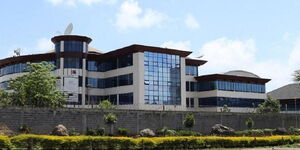Vice Chancellor Prof Freida Brown, trustees of USIU, administration, faculty, students, friends of USIU and, most important, the graduating class of 2015, it is wonderful to be here with you.
Let me congratulate you Prof Brown for the steady hand with which you have guided this university and ensured planned growth, solid infrastructure, flexible fee payment plan and world-class degree programs. Prof Brown has made a tremendous contribution to our nation.
I understand this is the last commencement event under your leadership. I wish you success in your next undertakings. I am proud of you. I admire the diversity of the student body; an international mix from 67 nations from every continent. For a reason, Americans call this commencement day.
This is an end and a beginning. It is a great beginning for the class of 2015. You graduate at a time of great changes and momentous challenges both here at home and across the globe.
In a weeks’ time, world leaders will gather in New York to declare an end to the MDGs and unveil the Sustainable Development Goals.
The post-2015 university education agenda is moving from “Education For All” to “Education 2030”, which focuses on ensuring inclusive and equitable quality education and lifelong learning for all. We are equally struggling with significant challenges including insecurity, ensuring inclusion in public affairs, marginalization, corruption, strengthening devolution and addressing unemployment.
In a very strange twist, tribalism is becoming a problem particularly in public universities. The seemingly uncertain future however comes with great expectations and opportunities.
It is because of the likes of you that President Barack Obama recently called Kenya an "incredibly gifted and blessed country." You must disregard the temptation to think that the best days are in the past. A whole new world lies ahead of you. You may take this home as your last lesson from this university.
Take pride in the years spent here. Thank your parents for investing in you. To the graduating parents, congratulations for the sacrifices you made fending for your families and completing class work. This is your day. Mine is to welcome you to life out of this campus.
And that brings me to the theme of my address. For all the talk about jobless graduates, the truth is that accessing university education is still a challenge to a majority of our citizens. So you must see yourselves as the lucky few. In the Education 2030, governments have committed to “a single renewed education agenda that is holistic, ambitious and aspirational, leaving no one behind.”
In our country, too many are being left behind. University education is neither inclusive nor equitable. About 15 of our 47 counties record primary enrollment rate of below 80 per cent. These are mostly the counties in Arid and Semi-Arid Lands. If the children are not enrolling for Primary school, they are certainly not going to university.
How to reverse this trend is a challenge our universities and the government must jointly address as we race towards 2030. Ensuring life-long learning rests squarely with universities. You must come up with affordable modes of delivering higher education programs that address individual limitations and cultural diversities; and technologies that reduce the existing divide between rural and urban areas; high-income and the poverty-ridden segments of society.
While the political leadership has a role in addressing this challenge by ensuring budgetary allocation and education friendly manifestos, universities must make it their duty to influence the political class through policy-oriented research. Issues of expansion, efficiency, equity and quality are best addressed based on research data. Research is critical to the realization of our Vision 2030 and Africa’s Vision 2063.
Africa’s universities have had a poor rating in global rankings largely because they lag behind in the execution and dissemination of research. Within the Continent, South African universities dominate the top raking because of a strong research agenda driven by significant government and corporate funding. The government and the private sector have to join hands and put our universities on the global research highway.
We must address the disconnect between university researchers and would be consumers. As Prime Minister in the Grand Coalition Government, I witnessed this disconnect where the government hires expatriates while experts exist in our universities but the government has no program for identifying and locating them.
The National Economic and Social Council tapped into this existing knowledge to great results. In successful higher education models, universities are respected as major intellectual engines of national planning, research and innovation.
These governments ensure close strategic engagement with universities and grow them into centers of excellence and brain trusts. Our governments need to set specific targets for university contribution to national development. As we set development goals, we should task specific universities, based on their known abilities, with the realization of specific projects in our development agenda, within a given time frame.
Until that is done, African universities will continue to lag behind and our governments will continue to record long lists of failed promises to electorates. One critical area of national development agenda with a critical gap is science and technology. We continue to have very little investment in the Sciences, Technology, Engineering and Mathematics (STEM).
The mushrooming private institutions of higher learning mainly thrive on humanities, social sciences and Business and Management courses and more recently law-related studies. Our country continues to lag behind in meeting its targets for professionals in Agriculture, Medicine, Engineering and Physical and Biological Sciences.
It is time we witnessed the introduction of these professional courses in young public and private universities. We need to develop a clear program for leveraging the unique capacities of the private sector in this vital field.
We need a clear program for attracting more teachers and students into STEM fields over a clearly defined period of time. I wish to appeal to USIU as the oldest private institution of higher learning in Kenya to consider taking leadership in this field. As a nation, we must create an enabling environment for universities play their role effectively.
USIU is a great private university. Until a few years ago, such universities were relatively free from government interference. In recent years however, the government has come up with regulations that are seen to be intrusive and overly prescriptive in the name of quality assurance. Quality is no doubt critical in education.
Standards must be set to promote national development agenda and meet global expectations. But there are credible concerns over what appears to be a misinterpretation the University Act that is making the government micromanage the design and delivery of courses. The government is even attempting to supervise and evaluate lecturers.
This approach undermines the autonomy and conventional universality of universities. Universities cannot and must not be identical. The government should be content with setting broad guidelines without purporting to regulate every aspect of campus life like hiring, firing, promotions, construction, fundraising and curriculum and educational programs.
Each university must be allowed to curve its niche through innovative programs that distinguish them in the job market and win them global recognition as centers of learning. The emerging taste for command and control is a typical case of fixing what is not broken and treating ailments that don’t exist.
The approach has already backfired with regard to admission in high school and middle level colleges. We have recently been treated to the drama of two admission lists to the Kenya Medical Training College. We have seen grade A students missing out on professional courses they applied for in public universities and databases of some universities indicating all spaces are taken when the reality is different.
As universities expand, they must also ensure that the number and caliber of faculty and staff meet global standards. There are currently questions whether the country is producing enough high caliber lecturers to drive the profusion of programs offered in mushrooming universities.
The lives and dignity of the students also matter. Students need to learn in an environment that reflects the dignity of a university. This calls for sound, well maintained infrastructure with up to date facilities including adequate Internet connectivity, secure residence to avert frequent cases of mugging and death of students.
USIU has done an excellent job in this area. The current trend of converting depleted property in unsecured neighbourhoods into university teaching centers threatens quality of learning and subverts the reputation of our universities. We need to rethink how to make life livable for students on campus and after.
We must find ways of making student loans adequate for their changing and growing needs. We must also rethink how to have students repay their loans without feeling punished for having gone to university. There is need to ease the burden on those who take up lower-paying public service jobs. And we must ask ourselves; what do we do with those who took loans but never completed university?
University education is not a luxury but a basic requirement for the development of our country and our youth. It should therefore be affordable to every family. The sad truth is, just like healthcare, university education is turning millions of parents into paupers and killing the dreams of millions of our children.
Streamlining student loans and cost of tuition must be part and parcel of the plan to improve access and equity in Kenya. Finally, as you join us out there beyond the campus, you know there are great-unsolved problems.
We need your ideas and engagement to restore the constitutional balance between our two levels of government. We need you to see counties as the new engines of development and growth in our country.
To the young graduates, I welcome you to the world of politics.
In nearly all political parties, we are embracing young people and new ideals. We are hiring more technocrats than never before. We are encouraging a critical look at the traditions of the past and questioning their value and worth. We need your energy. We need your ability to think differently.
I trust you to see farther than my generation did because we are offering our shoulders for your generation to stand on.
Congratulations, and God bless you.












